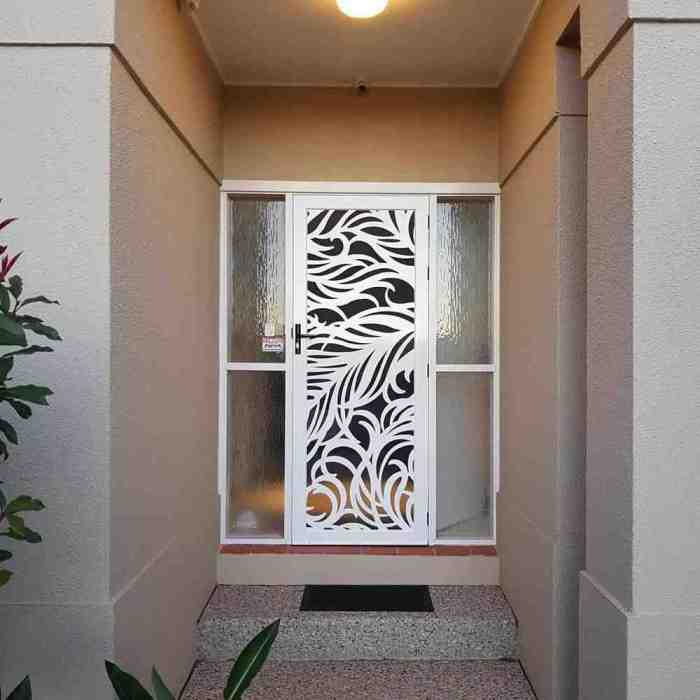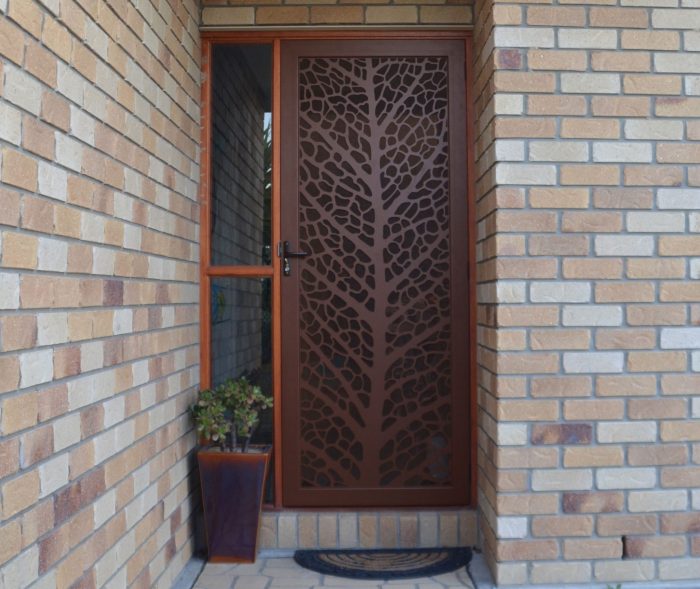Decorative screen doors: they’re more than just a practical barrier between your home and the outdoors; they’re a statement piece, a reflection of your personal style, and a significant contributor to your home’s curb appeal. From the classic elegance of a traditional wooden door to the sleek modernity of a metal design, the choices are vast and varied.
This guide delves into the world of decorative screen doors, exploring the diverse materials, styles, functionalities, and installation processes to help you choose the perfect door to complement your home.
We’ll cover everything from selecting the right material—wood, metal, bamboo, or composite—to understanding the different opening mechanisms and maintenance requirements. We’ll also explore the latest design trends and offer practical advice on installation and customization, ensuring you can confidently enhance your home’s aesthetic and functionality.
Types of Decorative Screen Doors

Decorative screen doors offer a blend of functionality and aesthetic appeal, transforming a simple entryway into a stylish focal point. The choice of material, design, and finish significantly impacts the overall look and longevity of the door. Understanding these factors is crucial for selecting the perfect screen door to complement your home’s style and withstand the elements.
Materials Used in Decorative Screen Doors
A wide array of materials contributes to the diverse range of decorative screen doors available. Each material offers unique properties regarding durability, aesthetic appeal, and maintenance requirements. The selection often depends on personal preference, budget, and the overall architectural style of the house.
- Wood: Wood screen doors, often crafted from durable hardwoods like oak or mahogany, provide a classic and elegant look. They can be stained or painted to match any décor, and intricate carvings or designs can be added for a truly personalized touch. However, wood requires regular maintenance to prevent rot and insect damage.
- Metal: Metal screen doors, typically made from aluminum or steel, are known for their strength and durability. Aluminum is lightweight and resistant to rust, while steel offers superior strength but may require protective coatings to prevent corrosion. Metal doors can be powder-coated in a variety of colors and finishes, offering a modern or industrial aesthetic.
- Bamboo: Bamboo screen doors offer a natural, eco-friendly option with a distinctly Asian-inspired aesthetic. They are lightweight and relatively inexpensive, but may require more frequent maintenance due to their susceptibility to moisture damage. The natural variations in bamboo color and texture add to their unique charm.
- Composite: Composite screen doors blend the best qualities of wood and other materials. They are often constructed from a combination of wood fibers, polymers, and other additives, resulting in a durable, low-maintenance product that resists rot, insects, and warping. Composite doors can mimic the appearance of wood but require less upkeep.
Design Styles for Decorative Screen Doors
The design style of a screen door significantly impacts its visual appeal and how well it integrates with the overall home design. Various styles cater to different tastes and architectural preferences.
- Modern: Modern screen doors often feature clean lines, minimalist designs, and neutral color palettes. Materials like aluminum or sleek composite materials are frequently used. The focus is on simplicity and functionality.
- Traditional: Traditional screen doors often incorporate classic details like raised panels, intricate moldings, and decorative hardware. Wood is a common material choice, often stained to highlight the wood grain. These doors evoke a sense of timeless elegance.
- Rustic: Rustic screen doors often feature distressed finishes, natural wood textures, and simple designs. They might incorporate reclaimed wood or materials with a weathered look. The overall effect is one of warmth and casual charm.
- Asian-Inspired: Asian-inspired screen doors often feature intricate latticework, bamboo materials, and natural color palettes. These doors often incorporate traditional Asian design elements and evoke a sense of serenity and tranquility.
Durability and Maintenance of Screen Door Materials
The durability and maintenance requirements of screen doors vary considerably depending on the material used. Understanding these differences is vital for making an informed decision.
| Material | Durability | Maintenance |
|---|---|---|
| Wood | Moderate; susceptible to rot and insect damage | Regular staining, sealing, and pest control |
| Metal (Aluminum) | High; resistant to rust and corrosion | Minimal; occasional cleaning |
| Metal (Steel) | High; very strong but susceptible to rust without proper coating | Regular inspection and touch-ups of protective coatings |
| Bamboo | Moderate; susceptible to moisture damage | Regular cleaning and protection from rain and humidity |
| Composite | High; resistant to rot, insects, and warping | Minimal; occasional cleaning |
Finishes for Decorative Screen Doors
The finish applied to a screen door significantly impacts its appearance and protection from the elements. Several options are available, each offering distinct benefits.
- Paint: Paint offers a wide range of color options and can be used to create a variety of looks, from bold and vibrant to subtle and understated. Regular repainting may be necessary to maintain appearance and protection.
- Stain: Stain penetrates the wood, enhancing its natural grain and color. It offers a more natural look than paint but may require more frequent reapplication to maintain protection.
- Powder Coating: Powder coating is a durable finish often applied to metal doors. It provides excellent protection against rust, corrosion, and scratches, and is available in a wide range of colors.
Cost and Maintenance

Investing in a decorative screen door offers both aesthetic appeal and practical benefits, but understanding the associated costs and maintenance requirements is crucial for making an informed decision. The total expense depends heavily on the chosen material, style, size, and installation complexity. Regular maintenance, however, can significantly extend the lifespan of your screen door and maintain its beauty.
Cost of Decorative Screen Doors
The price range for decorative screen doors is quite broad, influenced by factors such as material, size, design intricacy, and whether you opt for professional installation. A simple, standard-sized fiberglass screen door might cost between $100 and $300, while more elaborate wood doors with intricate carvings or glass inserts can easily reach $500 to $2000 or more. High-end, custom-designed metal doors with elaborate finishes can exceed $3000.
Installation costs typically range from $50 to $200, depending on the installer and the complexity of the job. Remember to factor in the cost of any necessary hardware, such as hinges and handles, which can add another $50-$150 to the overall expense.
Maintenance and Cleaning of Decorative Screen Doors
Maintaining your decorative screen door depends largely on the material. Wood doors require regular cleaning with a mild soap and water solution, followed by drying to prevent moisture damage. Applying a wood sealant every few years will protect against the elements and extend the door’s lifespan. Metal doors, especially those made of wrought iron or steel, are susceptible to rust.
Regular cleaning with a wire brush and a rust remover, followed by a protective coat of paint or sealant, is crucial. Fiberglass doors are generally low-maintenance; they can be cleaned with soap and water and require minimal upkeep. For all types of doors, screen mesh should be checked regularly for tears and repaired or replaced as needed.
Preventing Common Problems
Preventing common issues like rust, warping, and screen tears is key to extending the life of your decorative screen door. For metal doors, regular cleaning and the application of rust-resistant paint are essential. Properly sealing wood doors will prevent warping and rot caused by moisture. Keeping the door properly lubricated with a high-quality lubricant will help maintain the smooth operation of the hinges and prevent squeaking.
Regularly inspect the screen mesh for tears and promptly repair or replace damaged sections. Avoid slamming the door, as this can put stress on the hinges and frame.
Lifespan of Decorative Screen Door Materials
The lifespan of a decorative screen door varies significantly depending on the material and environmental conditions. Well-maintained wood doors can last for 20 years or more, especially if properly sealed and protected from excessive moisture. Fiberglass doors are known for their durability and can last for 30 years or longer with minimal maintenance. Metal doors, particularly those made of high-quality materials and properly maintained, can also boast a lifespan of 20-30 years.
However, harsh weather conditions, such as prolonged exposure to rain, snow, or extreme temperatures, can significantly reduce the lifespan of any material. Coastal environments with high salt content can accelerate rust and corrosion in metal doors.
Ultimately, the perfect decorative screen door is a blend of form and function, seamlessly integrating with your home’s architecture and reflecting your personal taste. By considering the factors discussed—material, style, functionality, and cost—you can transform a simple entryway into a stunning focal point. Remember to prioritize durability and maintenance, ensuring your chosen door remains a beautiful and functional addition to your home for years to come.
Embrace the opportunity to elevate your home’s exterior with a decorative screen door that truly makes a statement.